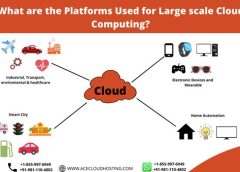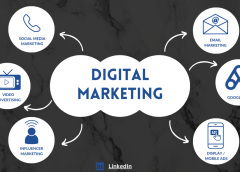In today’s digital age, cloud computing has emerged as a transformative force, revolutionizing the way businesses operate and individuals interact with technology. From seamless data storage to scalable computing power, the cloud offers a myriad of benefits. In this comprehensive guide, we’ll delve into the world of cloud computing, exploring the platforms used for large-scale operations, different deployment models, and the distinction between cloud computing and mobile computing.
Platforms Used for Large-Scale Cloud Computing
When it comes to large-scale cloud computing, several platforms have risen to prominence, each offering unique features and capabilities. Amazon Web Services (AWS), Microsoft Azure, and Google Cloud Platform (GCP) stand out as the frontrunners in the industry. These platforms provide a vast array of services, including infrastructure as a service (IaaS), platform as a service (PaaS), and software as a service (SaaS), catering to diverse business needs. Leveraging the robust infrastructure and extensive global network of these platforms, organizations can achieve unparalleled scalability, reliability, and performance.
Different Models for Deployment in Cloud Computing
Cloud computing offers various deployment models, allowing businesses to tailor their approach based on specific requirements and preferences. The three primary models include public cloud, private cloud, and hybrid cloud. Public cloud services, such as AWS and Azure, are hosted and managed by third-party providers, offering cost-effective scalability and accessibility. Private cloud solutions, on the other hand, provide dedicated infrastructure for exclusive use by a single organization, ensuring enhanced security and control. Hybrid cloud environments combine elements of both public and private clouds, enabling seamless integration and flexibility.
Difference between Cloud Computing and Computing for Mobiles
While cloud computing and mobile computing share some similarities, they serve distinct purposes and operate in different contexts. Cloud computing refers to the delivery of computing services over the internet, encompassing storage, processing, and networking capabilities. In contrast, mobile computing focuses on the use of mobile devices, such as smartphones and tablets, to access and interact with data and applications. While cloud computing enables centralized storage and processing of data, mobile computing emphasizes portability and mobility, catering to the on-the-go lifestyle of modern users.
Optimizing Your Cloud Computing Strategy for Success:
One key aspect of optimizing your cloud computing strategy is understanding the diverse range of services offered by leading platforms like AWS, Azure, and GCP. These platforms provide a wealth of tools and solutions designed to address various use cases, from data analytics and machine learning to IoT and DevOps. By familiarizing yourself with the capabilities of each platform, you can make informed decisions about which services align best with your business goals.
Another critical factor to consider is security and compliance.
While the cloud offers numerous benefits, including enhanced security measures and robust data encryption, it’s essential to implement best practices to safeguard your sensitive information. This may involve adopting multi-factor authentication, encryption protocols, and regular security audits to mitigate risks and ensure regulatory compliance.
Furthermore, scalability and agility are key drivers of cloud adoption. The ability to scale resources on-demand allows businesses to accommodate fluctuations in workload and adapt to changing market dynamics effectively. Leveraging technologies like serverless computing and containerization can further enhance agility, enabling rapid deployment and seamless integration of new features and updates.
Moreover, cost optimization plays a pivotal role in maximizing the value of your cloud investment. By leveraging tools and strategies for resource optimization, such as auto-scaling and reserved instances, you can minimize unnecessary expenses and optimize your cloud infrastructure for efficiency.
Conclusion
In conclusion, cloud computing represents a paradigm shift in the way we harness the power of technology. With its unparalleled scalability, flexibility, and cost-efficiency, the cloud has become indispensable for businesses and individuals alike. By leveraging platforms like AWS, Azure, and GCP, organizations can unlock new opportunities for innovation and growth. Whether deploying public, private, or hybrid cloud solutions, the key lies in understanding the unique needs of your business and leveraging the right tools and technologies to drive success in the digital age.






